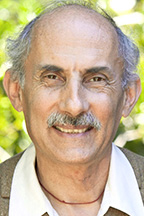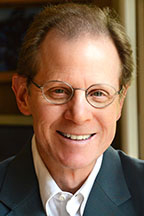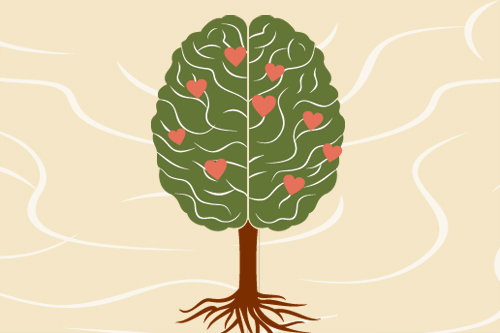I recently attended Omega NYC’s “The Neuroscience of Well-Being, Mindfulness & Love” workshop at the New York Society for Ethical Culture. It was led by Jack Kornfield, Ph.D., and Dan Siegel, M.D.—two people I’d wanted to hear in person for years.
Kornfield’s Seeking the Heart of Wisdom, which he wrote with Joseph Goldstein, was one of the first books about mindfulness and Buddhism I couldn’t stop reading and rereading. This was back in the days before Barnes & Noble had entire sections devoted to Meditation and Eastern Religion, and yoga classes were offered in every mall in the Midwest. Kornfield, trained as a Buddhist monk in Thailand, Burma, and India, is a clinical psychologist, co-founder of the Insight Meditation Society in Massachusetts, and founder of Spirit Rock Center in California.

Siegel, a pioneer in the field of interpersonal neurobiology, is clinical professor of psychiatry at the UCLA School of Medicine; on the faculty of the Center for Culture, Brain, and Development; co-director of the Mindful Awareness Research Center; and executive director of the Mindsight Institute, which examines the interface of human relationships and basic biological processes. As the mother of an adolescent, I’m really looking forward to his forthcoming book, Brainstorm: The Power and Purpose of the Teenage Brain.

The workshop attracted over 800 people and was a satisfying blend of mindfulness, poetry, science, and the poetry of science. Here are some highlights from a weekend that will stay with me for a long time to come:
What Is the Mind?
According to Siegel, science textbooks define the mind as “brain activity,” but they fail to explain how subjective experience and neurons firing co-create each other. Scientists say that “the mind is what the brain does” and that the brain is influenced by social stimuli. But the mind is not limited to the head—it’s embodied, not enskulled. In Siegel’s definition, the mind is an embodied and rational self-organizing process that regulates energy and information flow.
Kornfield added that we attain mental health when our consciousness can abide in resilience, balance, and lovingkindness. He reminded us to seek balance between our true natures and our identities—our Buddha (or true) selves and our Social Security numbers.
Mindfulness
Kornfield was instrumental in introducing the concept of mindfulness in the U.S. more than 40 years ago. He defines it as loving awareness or presence—a way of being that allows us to live with wisdom and compassion, instead of living out of habit, with an agenda. He outlined the four foundations of mindfulness—awareness of one’s body, feelings, mind, and the teachings of the Buddha—touchstones for any meditation practice. Kornfield also shared some of the current applications, including the Mindfulness-Based Mind Fitness Training program being used with Marines before deployment to build their capacity to bear witness to pain with a gracious heart.
Siegel spoke of how developing mindful awareness has been proven to boost the immune system. He cited Barbara Fredrickson’s studies about how living a life of “eudemonia”—a life of love—can alter our very genes and immune cells, creating an improved physical state.
Both Siegel and Kornfield stressed that mindfulness must be based in compassion. The two can’t be separated.
The Breath
Why does every culture use breath to focus attention? Siegel explained:
- Every breath is an opportunity to activate circuitry that is related to how well we attune our attention to others.
- Our breathing is affected by our emotional states.
- Awareness of our breath interweaves the inner and outer aspects of our lives, raising our implicit sense of knowing and interconnectedness.
- Breath is one of the few voluntary and involuntary bodily functions (like blinking and swallowing). By focusing on it, we can learn to sense and observe in tandem.
- Inhalation activates the autonomic nervous system, and this balance between sympathetic and parasympathetic awareness creates integration.
Buddhist Psychology
Siegel made it clear that he’d come to his meditation practice through science, not spirituality. But as a psychotherapist, he sees Buddhism as a science of the mind: “the first form of therapy” and “the first cognitive science” (it’s more than 2,600 years old, after all).
Buddhist psychology, as Kornfield explained, is rooted in seeing the inner nobility and beauty of all human beings—our original dignity or goodness or Buddha nature. No one can take this from us. As Kornfield wrote in the Shambhala Sun: “Buddhist psychology offers meditations, cognitive strategies, ethical trainings, which form a powerful set of practices that foster inner transformation. But it starts with a most radical vision, one that transforms everyone it touches: a recognition of the innate nobility and the freedom of heart that are available wherever we are.”
Insight + Empathy + Integration = Mindsight
Siegel’s website makes clear that “mindsight” is integral to his work as a scholar and a healer. Not only did he coin the term; he’s written books about it and there’s even a school—Blue School in New York City—that has built its curriculum around his approach.
“Mindsight” is our capacity to perceive the mind of the self and others. It is a lens through which we can examine our inner lives, integrate our brains, and enhance our relationships. Like mindfulness, it is a kind of “focused attention that allows us to see the internal workings of our own minds.” Siegel calls mindsight the key ingredient in secure attachments between people. It’s comprised of three elements:
- Insight into self
- Empathy for another—walking in his or her shoes
- Integration, harmony, and love
It Starts and Ends with Love
The workshop opened with a reading of Marie Howe’s powerful poem “What the Living Do” (below). From their dual perspectives, Kornfield and Siegel explored the mystery of love, which, as Kornfield put it: “like gravity, connects us all.”
 Siegel illustrated love through his experience as a psychiatrist, sharing the story of a patient who was suffering until he finally “felt felt” during therapy. He underlined the importance of empathic joy—experiencing happiness as a result of another person’s happiness. Kornfield agreed that truly listening to other people is the heart of love. Paying attention has a transformative effect on our lives.
Siegel illustrated love through his experience as a psychiatrist, sharing the story of a patient who was suffering until he finally “felt felt” during therapy. He underlined the importance of empathic joy—experiencing happiness as a result of another person’s happiness. Kornfield agreed that truly listening to other people is the heart of love. Paying attention has a transformative effect on our lives.
All 800 of us seemed reluctant to leave when the workshop was over, but we were sent on our way with a poignant quote from Guillaume Apollinaire, encouraging us to “pause in our pursuit of happiness and just be happy.”
Related Gallery
- The Neuroscience of Well-Being, Mindfulness & Love, poetry and other words of wisdom from the workshop by Jack Kornfield and Dan Siegel.
Post Disclaimer
This content is for informational purposes only and does not constitute medical advice. Please consult a healthcare professional for any medical concerns.




1 Comment
Rose Caiola
If we could all live our lives based on the concept: Insight + Empathy + Integration = Mindsight, I believe we’d all be happier and more mindful. It starts with having the willingness to unlock your mind and reach your full potential.